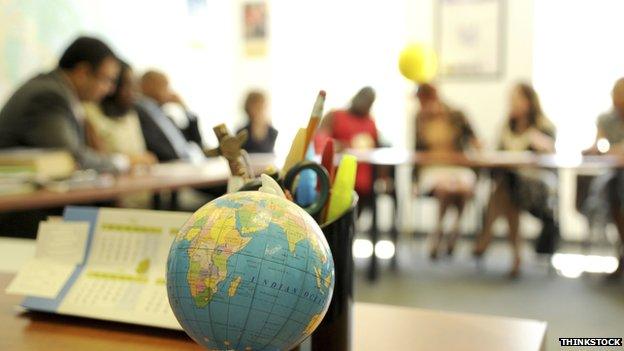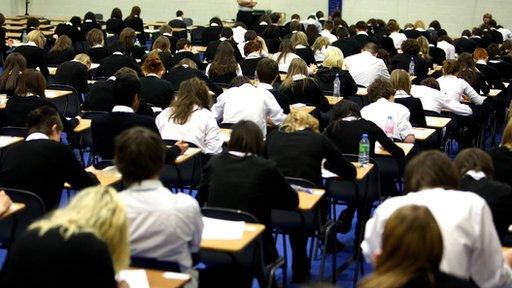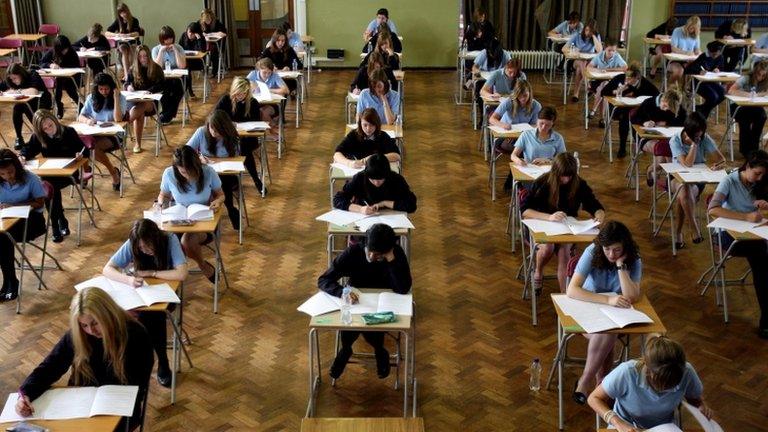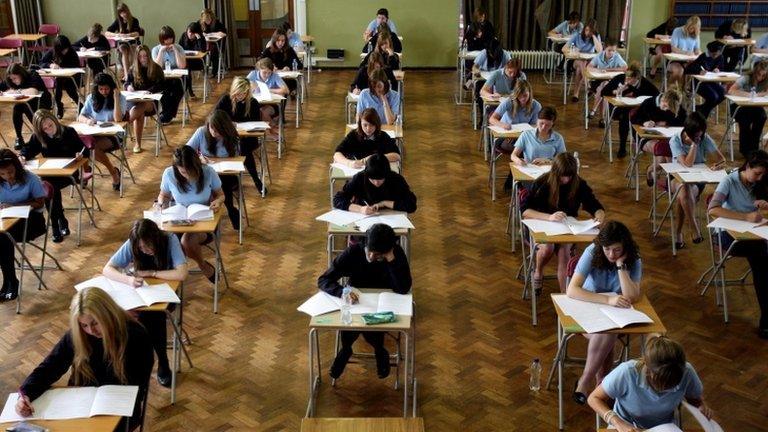Exam reform delayed by 'significant numbers' of schools
- Published

Some schools have delayed making the change to examinations
Dozens of schools across Scotland are delaying the introduction of new Highers in popular school subjects, according to BBC Scotland research.
New look Highers start in the new school year to tie in with the replacements for Standard Grades.
But a significant number of schools have chosen to delay them for a year in some popular subjects.
The Scottish government told councils the new Highers could be delayed if it was in the students' best interests.
However it said the expectation remained that S5 students would normally be sitting the new Higher exams next year.
BBC Scotland research indicates that most S5 students will be studying for new Highers but the situation varies widely across Scotland: in some council areas, schools have been allowed to delay the new Highers while in other council areas a single decision has been taken covering all schools to provide consistency.
BBC Scotland asked each of Scotland's 32 councils whether S5 students would be studying for the new or existing Highers in eight popular subjects: English, Maths, Chemistry, Physics, Biology, History, Modern Studies, Geography and History.
The responses revealed a mixed picture. For instance all schools in East Lothian will be offering the new Highers in these eight subjects while in Falkirk and Moray many fifth year students will still be studying for the "old" Higher in English.

Schools' responses
BBC Scotland asked each council in Scotland whether any of its secondary schools were delaying the introduction of the new Highers in eight popular subjects: English, Maths, Chemistry, Physics, Biology, History, Modern Studies, Geography, and History.
Some councils - including Glasgow, Edinburgh and Aberdeen - were unable to give specific information about individual schools and subjects but of those which were able to respond:
West Dunbartonshire: 5 schools are delaying Chemistry, Physics and Biology, 2 schools are delaying Geography and one school is delaying Mathematics.
Falkirk - 3 schools are delayed English , 1 is delaying in Maths.
Borders - 6 delaying in Geography, 4 delaying in Physics and Biology.
Midlothian - A spokesman said: "Half of departments within each of our six secondary schools are offering the new Highers and the other half are continuing with the old Highers."
Inverclyde, every secondary school is delaying in Chemistry and Physics.
Moray - 6 schools are delaying delaying in Chemistry, 4 in English, 6 in Maths
Orkney - One school delaying in Biology and Geography.

The changes to Highers are said to be "evolutionary rather than revolutionary" - designed to help match up Highers with the new National qualifications which are replacing Standard Grades.
This means a fifth year student studying for an old Higher could face some extra work to make up for any mismatch. But which type of Higher a candidate studies for should make no difference to their chances of getting accepted into college or university.
The old and new Highers are of equal academic value.
The intention was always to introduce the new Highers over two years as the old Higher would be more appropriate for sixth year students who had obtained Standard Grade qualifications. But it was originally envisaged that most fifth year students would normally be studying for the new Higher in popular subjects.
The largest teachers union, the EIS, said it was right that some authorities had been prepared to let schools decide whether the new Highers should be delayed.
Education Convener Susan Quinn said: "The EIS heard a significant amount of concern from teachers regarding the introduction of the new Highers as schools were still working flat-out on the delivery of the new National 4 and National 5 courses, often without the resources and support that they required.
"While the Scottish Government ruled out the call for a 1 year delay in the introduction of new exams, the EIS did welcome the decision to allow individual school departments to opt out of the new Highers if they felt this was in the best interest of pupils.
"This was a sensible approach that allowed subject departments to make an informed decision, based on teachers' professional judgement and the needs of pupils, on which version of the Higher pupils should work towards over the next year."
Ms Quinn added, "Delivering a programme of change on this scale is always challenging, particularly at a time of budget cuts, scarce resources and declining staff numbers, but teachers will continue to work hard to ensure that all pupils have the best chance to reach their potential no matter what level or type of qualification they are working towards."
A Scottish Government spokesperson said: "As the Cabinet Secretary for Education has made clear, Curriculum for Excellence is founded on the professional judgement of teachers. The implementation programme for Curriculum for Excellence provides some flexibility in the timing of the move to new Highers.
"What is most important is that each school and their authority work with parents and pupils to make use of the flexibility in the way which best serves the interests of the pupils. It is vital too that schools keep parents and pupils fully informed of the decisions taken.
"We are confident that schools across Scotland are putting the best interests of their young people at the heart of the judgements they are making."
- Published29 April 2014

- Published6 January 2014

- Published15 April 2014
